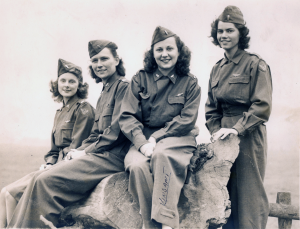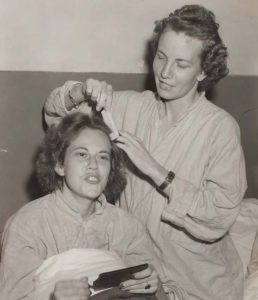Meet the former US Army flight nurses whom I interviewed for
Beyond the Call of Duty: Army Flight Nursing in World War II.
In 1986 as part of my research about flight nurse history and coping with war, I was privileged to interview 25 former US Army nurses about events of their flight nurse duty in World War II. Most of them are now deceased, but their stories live on in Beyond the Call of Duty: Army Flight Nursing in World War II.
The journal I kept of my time with each of them in 1986 when writing my dissertation offers a brief personal glimpse of these remarkable women. I am sharing edited versions of these journals, in the order in which the interviews took place. The actual interviews are in separate documents.
24th Interview
Hilda Halverson Chamberlain
826 MAES Pacific
21 June 1986
I met with Hilda in her home in Spokane, Washington. For the first leg of my journey, from San Jose to Seattle, I was booked in First Class, and what a luxury awaited me! I was impressed not only with Alaska Airlines but with the state of Washington—“God’s Country” is a phrase that comes to mind. Again, a rental car awaited me, and what a pleasure it was to drive the brand new silver Mustang.
Hilda lives in an area of the city with hills, trees, and old homes. She was waiting on her porch when I arrived and invited me in warmly. I knew that she had had cataract surgery earlier that week, and I was concerned that it might not be a good time for me to visit, but she had assured me that she would be fine. Other than a patch over her eye, she showed no ill effects from the surgery.
After talking casually, I explained how the interview would progress. She got us each something to drink, and we sat at her dining table for the interview. Hilda did not have a lot to say, but she shared the experiences she had remembered with an enthusiasm that made the interview an easy one to conduct. She enjoyed the chance to reminisce, since she said that she hadn’t thought about or been asked about her wartime experiences in a long time.
Hilda remembered irregular flying hours — leaving in the middle of the night and flying 16 or 18 hours, deadheading to a location to pick up patients for air evacuation, and flying them to their destination. Sometimes the flight nurses had only an hour or two on the ground before catching the next flight; mostly, though, they remained overnight away from their home station before catching the next flight back. She learned to sleep “real good” on the floor of a plane when deadheading without patients. Hilda recalled feeling tired most of the time, in part because the flight nurses were on alert to go at a moment’s notice, and in part because she always was thinking what she could “do for the next person.”
Packages from home were always a welcome treat when overseas, but a Christmas box that arrived in July was a huge disappointment. Hilda’s sisters had sent her a cake and some cookies, but the thick icing turned out to be mildew. She had promised to treat her flying colleagues, but they had to make do with some canned meat the sisters had enclosed, not with sweets.
I was conscious of the time, because I didn’t want to tire Hilda out, especially since she’d had the surgery on her eye earlier in the week. When it seemed that Hilda had no more experiences ready to share, and that my questioning was not bringing out much additional information, I chose to end the interview.
Hilda told me about a friend of hers in Spokane who was also a World War II flight nurse. Hilda had mentioned my coming to this friend, and, according to Hilda, the friend wanted to talk with me. Hilda got directions on how to get to the friend’s house and then sent me on my way so that I would have the opportunity to talk with her friend that evening while I was still in Spokane. I didn’t know if another interview would actually materialize. This situation of the informant knowing someone else who she thought wanted to be interviewed and setting me up to interview this person had been tried once before but didn’t work—the first time, the woman denied ever having said she would like to be interviewed. But partly to please Hilda, and partly because I’ve not yet turned down the chance to get an additional interview, I wound up my visit with Hilda to pursue yet another interview in the city.
One of Hilda’s stories: Hilda remembers flying with patients on board from Leyte in the Philippines to Saipan where the Japanese had just raided the airfield. It had been raining, and the Hilda and her enlisted technician off-loaded the patients as quickly as possible. She continues, “And then I heard somebody say, ‘Where’s the nurse? Is the nurse all right?’” She was down in the mud trying to cover a young soldier’s head wound, because she didn’t want it to get dirty. She laughs about the teasing she got afterward when they said, “Oh, we’d have never found you!”
Hilda died in 1993.



